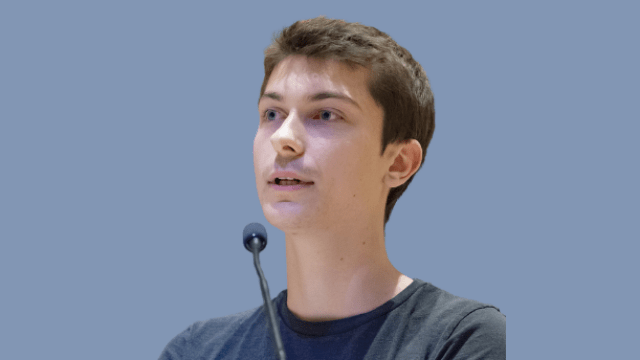Florian Dorchies is a former Normalien student from the Department of Education and Research (DER) in Chemistry.
"Students entering ENS Paris-Saclay will have access to a highly advanced scientific education. Beyond traditional paths in research and teaching, the School also offers opportunities for dual degrees with engineering schools, specific years in artificial intelligence or ecological transition sciences, and the chance to venture into entrepreneurship, among other options."
Can you tell us about your academic journey?
I studied in the Chemistry Department from 2017 to 2021.
During my third year, I undertook a Pre-Doctoral Research Year abroad (ARPE) at the Institute of Chemical Research of Catalonia (ICIQ) in Tarragona, Spain, under the supervision of Professor Antoni Llobet. My ARPE focused on constructing a Covalent Triazine-based Framework (CTF) architecture and a ruthenium-based molecular catalyst for photoinduced water oxidation.
I appreciate the School for implementing the ARPE program, providing the opportunity for a 9-month research stint abroad. It's a particularly enriching experience for those inclined towards research and for those who haven't had many chances to travel abroad.
Subsequently, I pursued my Master's 2 at Sorbonne University (Analytical, Theoretical, and Physical Chemistry – CAPT track), specializing in electrochemistry. I conducted my M2 internship at the Collège de France under the guidance of Alexis Grimaud, supported by a specific normalien doctoral contract (CDSN), which continued into my doctoral research.
Did you always know what you wanted to do when entering ENS Paris-Saclay?
Upon entering ENS Paris-Saclay, I knew I wanted to pursue academic research in chemistry, although the specific field was unclear. The breadth of topics covered in L3 and M1 provided clarity relatively quickly.
What is your doctoral research topic at Collège de France?
I owe my continuation into a Ph.D. to the School, currently pursuing my thesis at Collège de France under Alexis Grimaud's supervision with a specific normalien doctoral contract (CDSN). My thesis focuses on organic electrochemistry, specifically exploring how the composition and structuring of the electrolyte (solvent + supporting salt) at the nano and micrometer scale can influence organic electrochemical reactions and impact their efficiency/selectivity.
What are your future plans?
I aspire to become a researcher in academia, preferably at CNRS.
What has the School contributed to you during these 4 years of study?
A significant aspect of our chemistry education at ENS is the immersive internships during the first year. Spending a day per week in an ENS laboratory under the guidance of a researcher is solely aimed at discovering the research world. I was impressed by the availability and trust shown by the School's researchers throughout these internships, particularly by Gilles Clavier from the PPSM laboratory, with whom I did my internship.
The density of the curriculum taught in L3 and M1, covering a wide range of chemistry domains, provides an overall perspective to choose internships and a thesis in the field that suits us best. The richness of domains covered during our time at the School allows me to understand the basics of research areas I'm not a specialist in, facilitating scientific discussions with other students/researchers.
Lastly, the ARPE year allowed me to dedicate an entire year to research, accumulating experience in a research laboratory before starting my thesis. This year also confirmed my desire to continue in academic research.
What advice could you give to students who hesitate to come to ENS Paris-Saclay?
Students entering ENS Paris-Saclay will have access to a very high-level scientific education. Beyond the traditional opportunities in research and teaching, the School also offers the possibility of pursuing dual degrees with engineering schools, specific years in artificial intelligence or sciences for ecological transitions, the possibility of turning to entrepreneurship, etc. There is also a wide variety of clubs, sports, and associations detailed on the School's website and the alpha brochure, allowing for four very rich years academically and extracurricularly.

Comments0
Please log in to see or add a comment
Suggested Articles


